Breaking Barriers: Equal Access to Legal Representation
Equal access to legal representation is a fundamental pillar of a just and equitable society. Breaking barriers to ensure that everyone, regardless of their financial circumstances, can avail themselves of legal assistance is not just a moral imperative but a legal one. This article delves into the critical importance of equal access to legal representation, explores the challenges faced by those with limited financial means, and discusses initiatives to break these barriers.
The Foundation of Equal Access
In many legal systems worldwide, like the Turner Freeman Lawyers equal access to justice is enshrined. This principle reflects the belief that everyone should have the same opportunity to protect their rights and seek justice, regardless of their economic status. This concept is essential in maintaining the rule of law and upholding the principles of fairness and equality.
The Financial Hurdles
Access to legal representation often hinges on one’s financial circumstances. Those with ample resources can hire experienced lawyers to represent them in legal matters, while others may struggle to afford essential legal assistance. This economic divide can result in unequal outcomes in legal proceedings, with disadvantaged individuals at a distinct disadvantage.
Legal Aid: A Limited Solution
Many countries have established legal aid programs to address this disparity. These programs aim to provide free or low-cost legal advice to individuals who cannot afford the representation. However, the availability and scope of legal aid can vary widely from one jurisdiction to another. In some cases, the demand for legal assistance far exceeds the available resources, leaving many needing more help.
Challenges Faced by the Marginalised
Marginalised communities often bear the brunt of unequal access to legal representation. Individuals from low-income backgrounds, ethnic minorities, and other vulnerable groups may face additional obstacles, such as language barriers, discrimination, or a lack of awareness about their legal rights. These challenges further exacerbate their difficulties in accessing the legal system.
Initiatives for Equal Access
In recent years, there has been a growing recognition of the need to break down these barriers and ensure equal access to legal representation. Several initiatives and strategies have emerged to address this issue:
- Pro Bono Legal Services
Turner Freeman Lawyers involve lawyers providing their expertise and assistance to individuals in need without charging a fee. Many law firms and legal professionals actively work pro bono to bridge the access gap. This practice helps extend legal services to those who might otherwise be unable to afford them.
- Technology and Accessible Information
The digital age has brought about significant improvements in making legal information more accessible. Online resources, legal aid websites, and legal chatbots have become valuable tools in disseminating legal knowledge and providing essential guidance to individuals with legal concerns. This approach can empower people to take initial steps in addressing their legal issues.
- Community Legal Clinics
Community-based legal clinics offer individuals free or low-cost legal assistance within specific geographic areas. These clinics are often staffed by lawyers and volunteers who provide advice, document preparation, and referrals to further legal services. They play a crucial role in serving underserved communities.
- Legal Education and Awareness Programs
Raising awareness about legal rights and available resources is another vital aspect of promoting equal access to legal representation. Educational programs, workshops, and outreach efforts aim to inform individuals about their legal options and how to navigate the legal system effectively.
- Legislative Reforms
Some countries have introduced legislative reforms aimed at enhancing access to justice. These reforms may include changes in eligibility criteria for legal aid, expanding services, or establishing specialised courts to handle cases involving marginalised groups.
The Role of Non-Governmental Organisations (NGOs)
Non-governmental organisations (NGOs) dedicated to promoting equal access to legal representation play a significant role in advocating for change. They work tirelessly to raise awareness, provide legal support, and lobby for policy reforms that address the root causes of inequality within the legal system. These dedicated organisations operate as catalysts for positive change, amplifying the voices of those who would otherwise be unheard. Through strategic initiatives, public campaigns, and collaborative efforts with legal professionals and policymakers, NGOs champion the cause of justice for all. Their relentless commitment contributes to reshaping legal landscapes and ensuring that justice is attainable irrespective of financial circumstances.
Conclusion
Breaking barriers to equal access to legal representation is an ongoing struggle that requires a collective effort from governments, legal professionals, and civil society. The importance of this endeavour cannot be overstated, as it directly affects individuals’ lives and the overall fairness of our legal systems.
Ensuring everyone has a fair chance to seek justice, regardless of their financial circumstances, is not just a matter of legal obligation but a reflection of commitment to justice, equity, and the rule of law. It is a fundamental step toward creating a society where the doors of justice are open to all, regardless of their economic means.



